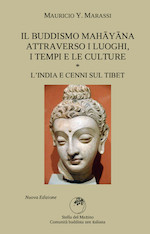In the USA and in Europe we are starting to take a critical look at the short history of Zen in the West and to ask ourselves how we allowed this marvelous dream of freedom to turn into a church – and an already old one at that — in just a few decades.
Some say it is the monks’, the leaders’ fault. Since what they want is power, they have had no qualms using the promise of co-optation into the clerical caste to subdue their followers’ conscience. Others instead point out that zen has become a business. Being a monk now is a job like any other: you can have a career, make money, be successful, make yourself famous – and not just within the world of zen but outside as well – in short, become some sort of celebrity, fêted, listened to, and, what is even more incredible, venerated. In fact zen monks are often invited to TV or radio shows to speak about all kinds of issues. Others travel all over the globe to provide for hundreds or even thousands of people whom they call — and who allow themselves to be called — students or disciples. Whose disciples one would like to ask? Nobody can stake a claim to zen.
Students of what kind of teaching? In zen there is no special teaching, nobody can impart it and nobody can learn it.
It even seems that some preach during zazen. To indoctrinate, they take advantage of the fact that those who sit in zazen have let go of all defensive mechanisms. These so called teachers fill the pure emptiness of their “disciples” with their own fantasies. It is scary. Zazen is the space where the deepest freedom lives. Occupy it and you kill it.
It sometimes also happens that these leaders, at the most innocent critical comment or at the smallest doubt on the meaning of all this rigmarole, subtly ostracize the daring rebel, neglect him, and give a slightly bigger slice of attention and power to those instead who are accustomed to obeying in silence and show in this way their enlightenment – enlightenment which, in this context cannot but mean their disposition to keep quiet and toe the line.
All this in the name of the dharma. A very strange and grotesque dharma indeed! One that affords authority and power to some, and shapes around them cliques arranged in strict hierarchical order and surrounded lower down by feverish wannabes, who are anxious, even eager to please and to serve. But the dharma, zen is not about freeing ourselves, and the others, from ourselves?
There are those who believe that this bizarre and disgraceful state of affairs is the result of the errors of the Japanese founders. They argue that their very Japan-ness makes them incapable to sow a virgin earth without trying to shape its sprouts. Also, one points to their greed for disciples and fame, and their limited knowledge of the real teaching of Buddha, which they replace with rituals, forms and attitudes typical of the Japanese culture and sell, perhaps in good faith, as true zen Buddhism.
Europe’s Deshimarus, America’s Suzuki, Katagiri and others, are the target of very harsh criticism even from those who have adopted their ways, and been granted by them the entitlement to teach today.
It is as if in zen Buddhism, having lived in a certain monastery or having had contacts with a certain person years back could grant today a status beyond reach of those who have done neither.
I am afraid all this is true, we have made a big mistake.
Our biggest error has been to present zen as something special, which needs to be handled by special people, who breed other people until they too become “special” (but not as special as themselves of course). It is like a spiritual Ponzi scheme (1) .
In this scheme of things, enlightenment plays an important role. Only those that are really really special can confer it, and yet it is just a piece of paper, full of cryptic (and the more precious for this) signs, plus something special to wear that expresses –or demonstrates– the achieved enlightenment,
And here is the rub: the enlightenment. Enlightenment was indispensable to Buddha. Without it he could have not realized the fundamental practice of awakening. But we, just because of Buddha’s enlightenment, have it already. We know that zazen is certain path to salvation: what other enlightenment should we be seeking?
Unfortunately the only enlightenment left for grabs, is that which can be granted by the “most special of all”. But it is only his whims that lift one up or pushes one down and for no good reason at all. All this while waiting for the moment when he leaves this world and his post behind. Only one seat with many that want it: conflicts, enmities, slanders.
In the meantime zen…
Why does it seem impossible for a world to emerge where if you want to do zazen you just do it, alone or with others, while earning your living in dignity, without any particular need to undergo a training or to get a license?
Mauricio Yushin Marassi
(1) http://en.wikipedia.org/wiki/Ponzi_scheme
Se volete, lasciate un commento.
You must be logged in to post a comment.







